Filter by
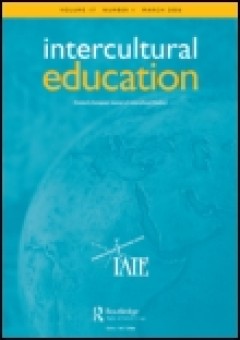
Researching ethnic 'others' : conducting critical ethnographic research in Au…
In many parts of the world, classrooms are characterised by cultural and ethnic diversity. Increasingly, researchers are interested in exploring these rich and socially complex contexts. However, research into 'the ethnic other' can present complex ethical and methodological challenges. In this paper, the authors discuss, with reference to their respective studies in Australia and Scotland, the…
- Edition
- Volume 21, Issue 6, Dec 2010, Pages 493 - 503
- ISBN/ISSN
- 14675986
- Collation
- -
- Series Title
- Intercultural Education
- Call Number
- -
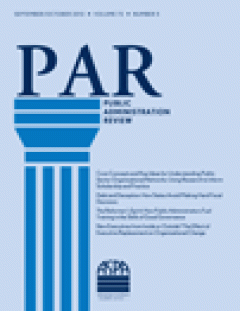
Toward “Strong Democracy” in Global Cities? Social Capital Building, Theo…
With faith in government waning, cultural diversity spiraling, and fiscal stress straining the ability of policy makers to address the policy challenges accompanying these developments, the salience of (re)connecting citizens with government takes on renewed urgency today. Nowhere is this more the case than in urban America, where so-called global cities teeming with ethnic diversity and contro…
- Edition
- -
- ISBN/ISSN
- 00333352
- Collation
- -
- Series Title
- -
- Call Number
- -
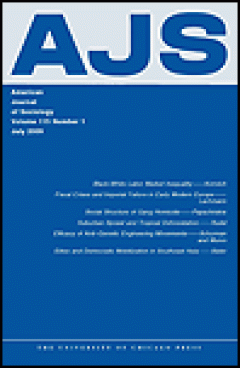
Getting Personal : Networks and Stratification in the Russian Labor Market, 1…
The authors use employment histories from survey data to examine personal network use and stratification in the Russian labor market from 1985 to 2001. Institutional changes associated with the Soviet collapse increased the use of networks and shaped their prevalence and benefits in theoretically coherent ways. In Russia, networks positively affect job quality, whether measured by occupation, c…
- Edition
- Vol. 116, No. 3, November 2010. pp. 855-908
- ISBN/ISSN
- 00029602
- Collation
- -
- Series Title
- American Journal of Sociology
- Call Number
- -

The Structure of Educational Decision Making and Consequences for Inequality …
Class differences in educational decision making are important for inequality. A unique Swedish population-level database of university applications and individuals� ranking of different programs is used to analyze class differences in preferences for different program characteristics. Compared to individuals from service class backgrounds, individuals from manual labor class backgrounds choose…
- Edition
- Vol. 116, No. 3, November 2010. pp. 806-854
- ISBN/ISSN
- 00029602
- Collation
- -
- Series Title
- American Journal of Sociology
- Call Number
- -

When Formal Laws and Informal Norms Collide : Lineage Networks versus Birth C…
Ancestor worship and bloodline continuation are the core norms of lineage in China. Beginning in the late 1970s, these cultural norms came into direct confrontation with the state birth control policy. Pitched against each other are the antinatalist laws backed by the powerful and unyielding state apparatus on the one side and the ancient pronatalist norms backed by revived lineage networks on …
- Edition
- Vol. 116, No. 3, November 2010. pp. 770-805
- ISBN/ISSN
- 00029602
- Collation
- -
- Series Title
- American journal of Sociology
- Call Number
- -

The Right to Difference : Explaining Colombia’s Shift from Color Blindness …
Drawing on archival analysis and in-depth interviews, this article examines Colombia�s adoption of policies for black Colombians in 1993. It argues that Afro-Colombian activists were able to seize upon changes in global policy norms around multiculturalism and state disequilibrium both by deploying traditional social movement strategies and by framing their demands in terms of ethnic difference…
- Edition
- Vol. 116, No. 3, November 2010. pp. 729-769
- ISBN/ISSN
- 00029602
- Collation
- -
- Series Title
- American Journal of Sociology
- Call Number
- -
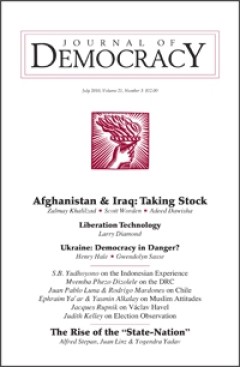
Two Essays on China’s Quest for Democracy
Imprisoned Chinese dissident Liu Xiaobo, who was awarded the 2010 Nobel Peace Prize, is best known for his eloquent and incisive essays. Two of them are featured here: �Can It Be That the Chinese People Deserve Only �Party-Led Democracy�?� and �Changing the Regime by Changing Society.�
- Edition
- Volume 22, Number 1, January 2011.pp. 152-166
- ISBN/ISSN
- 10455736
- Collation
- -
- Series Title
- Journal of Democracy
- Call Number
- -

Determining the informational, navigational, and transactional intent of Web …
In this paper, we define and present a comprehensive classification of user intent for Web searching. The classification consists of three hierarchical levels of informational, navigational, and transactional intent. After deriving attributes of each, we then developed a software application that automatically classified queries using a Web search engine log of over a million and a half q…
- Edition
- Vol. 44, No. 3, Page 1251-1266
- ISBN/ISSN
- 0306-4573
- Collation
- -
- Series Title
- Information Processing & Management
- Call Number
- -
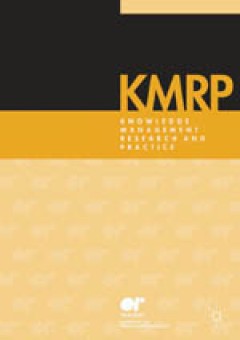
Junior researchers’ experience of innovation in a multidisciplinary team en…
This paper describes junior researchers� experience of innovative research, with the aim of encouraging fellow junior academics. Through the experience, the team recognised that context and flexibility are key factors in the research process. These factors are discussed in the light of three specific features of this project. First is the type of research the team engages in: meta-research, whi…
- Edition
- Vol. 9, No. 2, March 2011.pp.95–97
- ISBN/ISSN
- 14778238
- Collation
- -
- Series Title
- Knowledge Management Research & Practice
- Call Number
- -

Reflections on the Spirit and Work of the U.S. Advisory Commission on Intergo…
What did the U.S. Advisory Commission on Intergovernmental Relations (ACIR) accomplish before it was disbanded in 1996? Were its accomplishments sufficiently valuable to justify reestablishing the organization? This article reviews the commission�s origins, history, and accomplishments, and addresses future intergovernmental needs. The ACIR�s accomplishments were substantial, but are largely un…
- Edition
- Vol. 71, Issue 2, March/April 2011. pages 161–168
- ISBN/ISSN
- 00333352
- Collation
- -
- Series Title
- Public Administration Review
- Call Number
- -

An ACIR Perspective on Intergovernmental Institutional Development
This article traces the creation and demise of the U.S. Advisory Commission on Intergovernmental Relations (ACIR) and assesses the prospects for restoring an ACIR-like capability to the federal system. Recent initiatives by the National Academy of Public Administration, the Big 7 state and local government official associations, and Congress are summarized, and the facilitating and inhibiting f…
- Edition
- Vol. 71, Issue 2, March/April 2011, pages 169–176
- ISBN/ISSN
- 00333352
- Collation
- -
- Series Title
- Public Administration Review
- Call Number
- -

Reflections of a Member of the U.S. Advisory Commission on Intergovernmental …
There is consensus on the need for a successor to the U.S. Advisory Commission on Intergovernmental Relations in Washington, D.C., but no agreement on how this entity should be organized and funded and what it should do. There are now many players, both organizations and individuals, in the intergovernmental field, and they need to be sorted out. A key distinction is that American federalism is…
- Edition
- Vol 71, Issue 2, March/April 2011, pages 177–180
- ISBN/ISSN
- 00333352
- Collation
- -
- Series Title
- Public Administration Review
- Call Number
- -

The U.S. Advisory Commission on Intergovernmental Relations : Unique Artifact…
The U.S. Advisory Commission on Intergovernmental Relations (ACIR) befitted an era marked by low party polarization, bipartisanship, and cooperative federalism. Although the ACIR�s work was valuable, the growth of federal power, rise of party polarization, and the decline of bipartisanship, along with many other political, governmental, and social changes during its 37-year life (1959�96), marg…
- Edition
- Vol 71, Issue 2, March/April 2011, pages 181–189
- ISBN/ISSN
- 00333352
- Collation
- -
- Series Title
- Public Administration Review
- Call Number
- -

The Current Status and Roles of State Advisory Commissions on Intergovernment…
During the 1970s and 1980s, a number of states created entities commonly called advisory commissions on intergovernmental relations (ACIRs). Although as many as half the states at one time or another supported an ACIR, only about 10 do so today. Relying on face-to-face and telephone interviews, e-mail correspondence, website analysis, and mailed surveys of directors and other staff members of a…
- Edition
- Vol 71, Issue 2, March/April 2011, pages 190–195
- ISBN/ISSN
- 00333352
- Collation
- -
- Series Title
- Public Administration Review
- Call Number
- -

“Big Questions” about Intergovernmental Relations and Management : Who Wi…
Fiscal, administrative, and political tensions among the partners in the federal system have not eased, and perhaps have grown, since the demise of the U.S. Advisory Commission on Intergovernmental Relations in 1996. Yet no governmental organizational capacity exists to address big intergovernmental questions in an ongoing manner through nonpartisan or bipartisan research, data collection, deli…
- Edition
- Vol 71, Issue 2, March/April 2011, pages 196–202
- ISBN/ISSN
- 00333352
- Collation
- -
- Series Title
- Public Administration Review
- Call Number
- -

Public Sector Labor Relations Scholarship : Is There a “There,” There?
Public sector union membership is thriving compared to the private sector. Moreover, public employee unions play a significant role in policy making at every level of government. Yet research on public sector labor relations is sporadic and uneven, perhaps negligible. Why so? This article surveys the literature on public sector unionism and seeks to answer that question. Its conclusion points t…
- Edition
- Vol 71, Issue 2, March/April 2011. pages 203–209
- ISBN/ISSN
- 00333352
- Collation
- -
- Series Title
- Public Administration Review
- Call Number
- -

Accountability in Governance Networks : An Assessment of Public, Private, and…
What is the most effective framework for analyzing complex accountability challenges within governing networks? Recognizing the multiscale and intersector (public, private, and nonprofit) characteristics of these networks, an accountability model is advanced organized around democratic (elected representatives, citizens, and the legal system), market (owners and consumers), as well as administr…
- Edition
- Vol 71, Issue 2, March/April 2011, pages 210–220
- ISBN/ISSN
- 00333352
- Collation
- -
- Series Title
- Public Administration Review
- Call Number
- -

Strengthening Efforts to Engage the Hispanic Community in Citizen-Driven Gove…
How can the Hispanic community in Utah strengthen its active engagement in government? Interviews by the authors with key government and community-based organization representatives offer evidence on (1) who is being engaged in the Hispanic community, (2) what are the barriers to engagement, and (3) which modes of engagement are likely to be effective and under what conditions. Findings indicat…
- Edition
- Vol 71, Issue 2, March/April 2011, pages 221–231
- ISBN/ISSN
- 00333352
- Collation
- -
- Series Title
- Public Administration Review
- Call Number
- -

Waste in the Sewer : The Collapse of Accountability and Transparency in Publi…
Following failed auctions for sewer debt in April 2008, major bond rating companies downgraded Jefferson County, Alabama�s bond rating to D (default) triggering massive mandatory payments by the county to its creditors. At the time of writing, the county teeters on the brink of actual default and bankruptcy, unable to pay service on its $3.3 billion sewer debt portfolio. If the county defaults,…
- Edition
- Vol 71, Issue 2, March/April 2011, pages 232–242
- ISBN/ISSN
- 00333352
- Collation
- -
- Series Title
- Public Administration Review
- Call Number
- -

Aligning Ideologies and Institutions : Reorganization in the HIV/AIDS Service…
How effective was organizational reform implemented inside one critical New York City health agency? Specifically, we examine the extent to which the reorganization of the HIV/AIDS Services Administration (HASA) into the Medical Insurance Services Administration (MICSA) achieved three goals: (1) realizing synergies among the component MICSA programs; (2) cross-fertilizing ideas among MICSA agen…
- Edition
- Volume 71, Issue 2, March/April 2011, pages 243–25
- ISBN/ISSN
- 00333352
- Collation
- -
- Series Title
- Public Administration Review
- Call Number
- -
 Computer Science, Information & General Works
Computer Science, Information & General Works  Philosophy & Psychology
Philosophy & Psychology  Religion
Religion  Social Sciences
Social Sciences  Language
Language  Pure Science
Pure Science  Applied Sciences
Applied Sciences  Art & Recreation
Art & Recreation  Literature
Literature  History & Geography
History & Geography